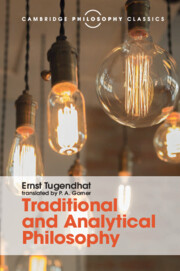Book contents
- Frontmatter
- Dedication
- Contents
- Preface
- Preface
- Translator's preface
- Part I Introduction: confrontation of analytical philosophy with traditional conceptions of philosophy
- Part II A first step: analysis of the predicative sentence
- 8 Preliminary reflections on method and preview of the course of the investigation
- 9 Husserl's theory of meaning
- 10 Collapse of the traditional theory of meaning
- 11 Predicates: the first step in the development of an analytical conception of the meaning of sentences. The dispute between nominalists and conceptualists
- 12 The basic principle of analytical philosophy. The dispute continued. Predicates and quasi-predicates
- 13 The meaning of an expression and the circumstances of its use. Dispute with a behaviouristic conception
- 14 The employment-rule of an assertoric sentence. Argument with Grice and Searle
- 15 Positive account of the employment-rule of assertoric sentences in terms of the truth-relation
- 16 Supplements
- 17 ‘And’ and ‘or’
- 18 General sentences. Resumption of the problem of predicates
- 19 The mode of employment of predicates. Transition to singular terms
- 20 What is it for a sign to stand for an object? The traditional account
- 21 The function of singular terms
- 22 Russell and Strawson
- 23 What is ‘identification’?
- 24 Specification and identification. Specification and truth
- 25 Spatio-temporal identification and the constitution of the object-relation
- 26 Supplements
- 27 Results
- 28 The next steps
- Bibliography
- Index of names
- Index of subjects
18 - General sentences. Resumption of the problem of predicates
from Part II - A first step: analysis of the predicative sentence
Published online by Cambridge University Press: 05 August 2016
- Frontmatter
- Dedication
- Contents
- Preface
- Preface
- Translator's preface
- Part I Introduction: confrontation of analytical philosophy with traditional conceptions of philosophy
- Part II A first step: analysis of the predicative sentence
- 8 Preliminary reflections on method and preview of the course of the investigation
- 9 Husserl's theory of meaning
- 10 Collapse of the traditional theory of meaning
- 11 Predicates: the first step in the development of an analytical conception of the meaning of sentences. The dispute between nominalists and conceptualists
- 12 The basic principle of analytical philosophy. The dispute continued. Predicates and quasi-predicates
- 13 The meaning of an expression and the circumstances of its use. Dispute with a behaviouristic conception
- 14 The employment-rule of an assertoric sentence. Argument with Grice and Searle
- 15 Positive account of the employment-rule of assertoric sentences in terms of the truth-relation
- 16 Supplements
- 17 ‘And’ and ‘or’
- 18 General sentences. Resumption of the problem of predicates
- 19 The mode of employment of predicates. Transition to singular terms
- 20 What is it for a sign to stand for an object? The traditional account
- 21 The function of singular terms
- 22 Russell and Strawson
- 23 What is ‘identification’?
- 24 Specification and identification. Specification and truth
- 25 Spatio-temporal identification and the constitution of the object-relation
- 26 Supplements
- 27 Results
- 28 The next steps
- Bibliography
- Index of names
- Index of subjects
Summary
The two forms of complex sentence I dealt with in the previous lecture belong to a particularly simple and semantically transparent species of complex sentence, those namely whose truth-value is determined by the truth-values of their constituent sentences, thus sentences – or the assertions made with them – which are truth-functions of their constituent sentences (or of the assertions made with them). There are other forms of complex sentence whose truth-value (or that of the corresponding assertions) does not depend, or does not only depend, on the truth-value of their constituent sentences (or constituent assertions). Thus, for example, the forms ‘q because p’ and ‘if p then q’ e.g. ‘The bus crashed because the driver was drunk.’ Clearly such a sentence can only be true if both its constituent sentences are true. But this is not sufficient. It can be true that the bus crashed and that the driver was drunk, but false that the bus crashed because the driver was drunk. Thus the truth of such an assertion does not only depend on the truth-value of its constituent assertions. In this case there is clearly in addition a certain grounding-relationship between the two constituent assertions. The situation is similar in the case of the forms ‘If the driver had been drunk, the bus would have crashed’ and ‘If the driver is drunk, the bus will crash.’ A connection of ground and consequence is also asserted in statements of the ‘if–then’ form, only now it is presupposed – in the case of the counter-factual conditional – that the constituent sentences are false or – in the other case – that the truth-value is left open.
The distinction between truth-functional (so-called extensional) and non-truth-functional (so-called intensional) complex statements stems from Frege. The discussion of the different forms of intensional complex statements in Frege's paper ‘On Sense and Reference’ is probably still the most comprehensive. The semantics of intensional complex statement-forms is still today a matter of controversy. I shall not go into it here. At the moment I am only concerned that you do not draw too far-reaching conclusions from the fact that intensional complex statements are not truth-functional.
- Type
- Chapter
- Information
- Traditional and Analytical PhilosophyLectures on the Philosophy of Language, pp. 253 - 266Publisher: Cambridge University PressPrint publication year: 2016

